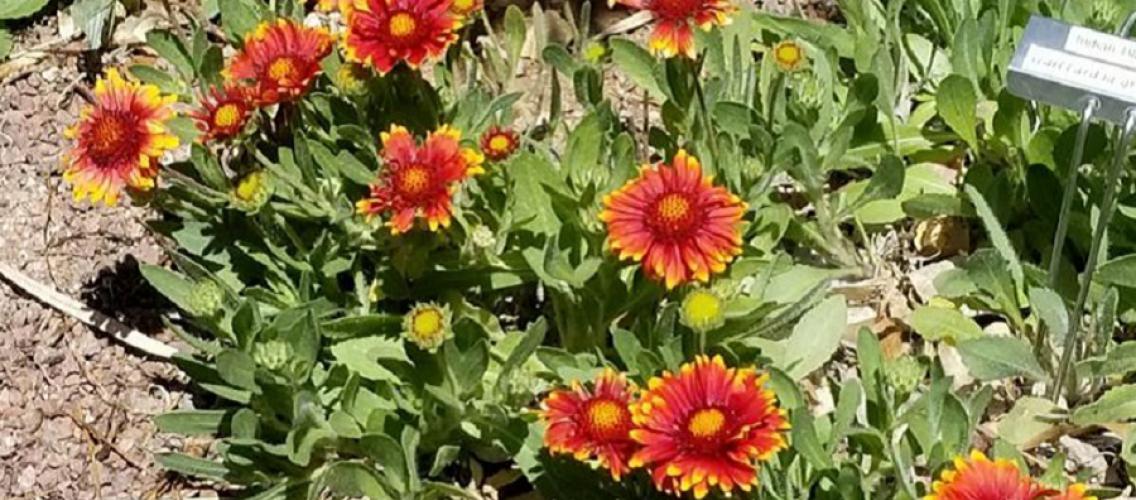
Get outdoors and garden: It’s good for you!
University of Arizona Cochise County Cooperative Extension
It seems you cannot turn on a television in this crazy COVID-19 time without hearing concern about stress, and lots of advice on how to handle it. They tell you to binge-watch your favorite television series, have a marathon with Netflix, meditate, do yoga, drown yourself in arts & crafts, or even clean out that guest room closet that’s been accumulating a plethora of treasures you just can’t part with. These are all great, fun ideas. But the advisers are not encouraging one of the healthiest stress relievers of all – gardening!
You can garden almost anywhere, whether you have a yard, open acreage, a container garden or vertical garden on a patio, a pot on a small apartment deck or a container on a window ledge. Gardening does not have to be only about growing edibles. You can add to your landscape with Arizona natives and desert-adapted beauties. You can grow smaller trees, shrubs, or perennials in containers. Or, you can simply grow a beautiful flower bed or a simple pot of flowers to provide nectar for the pollinators. My choice? I’m obsessed. Do it all if you can!
Let’s talk about the multiple reasons why gardening and being outdoors in nature is so very good for you.
Regarding growing your own edibles, there is nothing quite as rewarding as gathering fresh veggies, fruits, and herbs from you own garden to prepare a meal or even a snack. My husband will often eat his way through the garden while strolling through to water. Fresh veggies still have their high vitamin and mineral content, not to mention their incomparable robust flavor! Also, you know how they’ve been handled, and you know what soil and products have been used to produce them.
Growing and eating your own fresh edibles leads to healthier eating habits. Studies show that when children and adults are exposed to eating fresh edibles, they tend to form healthier lifestyle habits. It is also shown that folks who eat from their gardens are more likely to try a larger variety of vegetables and fruits.
Regarding physical benefits, gardening is wonderful exercise. Think about it. When you’re gardening, (and moving ergonomically correctly), you are pulling, pushing, lifting, bending, and stretching. This all contributes to building strength in your hands, arms, legs, and your core. The CDC, (Center for Disease Control) states that 2.5 hours per week of “moderate intensity” activity will “help lower blood pressure, lower heart disease risk, lower risk of diabetes, risk of stroke, risk of various cancers, and depression”. The CDC further classifies gardening as a “moderate intensity” activity.
The CDC has also stated the people who choose gardening as an activity will stay active 40-50 minutes longer than with other activities. And remember, gardening burns lots of calories!
A comment of encouragement to make here … there is a certain “gardening fitness” to be obtained. No matter how much you work out, when you first start gardening you will use muscles and movements you don’t normally use. Don’t get discouraged during your first couple of weeks with a new fatigue or soreness. Stay with it! Your “gardening fitness” will come!
You will also acquire and maintain more body flexibility when you garden regularly. A flexible, limber body not only feels better, but it is less prone to injury. (Personal note: even in my older age, I can still touch the ground with flat hands and straight legs! I credit gardening fitness.)
Regarding mental status, numerous studies from universities, the CDC, the NIH (National Institutes of Health), and more have shown that gardening of any kind and being outdoors in nature will elevate mood and provide an emotional boost. The reward of gardening activities releases the feel-good hormone, dopamine. The release of serotonin, which is a natural antidepressant and immune system strengthener, is also triggered during gardening. Further scientific studies show that serotonin is released with skin contact to soil and the soil bacteria, Mycobacterium vaccae. No wonder why so many gardeners are addicted to getting their hands in the dirt!
Gardening can improve mental clarity and focus. Just getting outdoors in nature and being active can help clear a foggy brain and help “change your mind”. It has even been proven that folks who continue to garden into their senior years have far less dementia. Other studies have shown that gardening activities can help prevent or lessen ADD.
Regarding the physiologic stress relief benefits — sustained stress can play a role in a multitude of ailments like headaches and stomach aches. Further, sustained stress raises the body’s level of the stress hormone, cortisol. Continued exposure to cortisol can have negative effects and play a role in such conditions as elevated blood pressure and heart rate, diabetes risk and complications, heart disease, asthma, skin conditions, arthritis, and many more. Numerous studies have shown that a session out in the garden or a walk through nature can lower the body’s cortisol level within an hour or two, and can lower blood pressure and heart rate.
Gardening can provide some tranquility and the release of negative energy. Hospital studies have even shown that hospitalized patients who have a window in their room where they can see plants, trees and nature will recover 20% faster than patients with no window to an outdoor view. For that reason, many hospitals are beginning to focus on providing a window with a view to green space for each patient room.
You should Google the topics of “Benefits of Gardening,” or “Mental Benefits of Gardening.” The number of countless scientific studies and reports will amaze you. Another fascinating topic is “Forest Bathing.”
Let gardening of any kind bring you some serenity, joy, reward, and be somewhat of a sanctuary for you. The benefits are countless.

